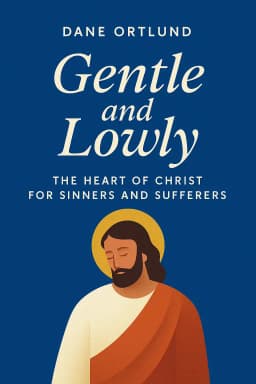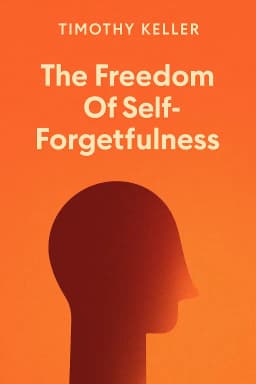
The Leadership Paradox
Golden Hook & Introduction
SECTION
Daniel: Most leadership books tell you to take charge, be decisive, and climb the ladder. What if the most powerful first step to becoming a truly great leader is to get fired? Or at least, to be willing to. Sophia: Okay, that is a wild opening line. Getting fired as a career strategy? You’ve definitely got my attention. That sounds like the worst advice I've ever heard, but I have a feeling there's a brilliant twist coming. What are we diving into today? Daniel: We are diving into a book that completely flips the script on leadership. It's called Eight Sessions on Becoming a Values-Driven Leader, and it's by Richard Stearns. Sophia: Richard Stearns. The name sounds familiar. Daniel: It should! And he’s a fascinating author for this topic. He wasn't a pastor or a theologian his whole life. He was the CEO of major companies like Parker Brothers—yes, the people who made Monopoly—and Lenox, the fine china company. Then he made this massive career pivot to become the president of World Vision, the global humanitarian aid organization. Sophia: Whoa. Okay, so he's lived in both universes. The cutthroat corporate world and the mission-driven non-profit world. That makes his ideas all the more compelling, especially when he uses a word that feels like the opposite of everything we're taught about leadership. Daniel: Which word is that? Sophia: Surrender. Let's start there, because that word alone makes my ambitious, type-A personality break out in a cold sweat.
The Leadership Paradox: Why Surrender is the Ultimate Power Move
SECTION
Daniel: I get it. In our culture, "surrender" sounds like waving a white flag. It sounds like defeat. But Stearns argues it's the absolute, non-negotiable starting point for values-driven leadership. And he learned this the hard way. He tells this incredibly vulnerable story from his own life. Sophia: Oh, I love when authors put their own skin in the game. What happened? Daniel: Early in his corporate career, he was on the fast track. Climbing the ladder, getting the promotions, doing everything right. And then, one day, he was fired. Just like that. He said it was a complete shock, a total ego-crush. His identity was wrapped up in his title, his success, his forward momentum. Sophia: I think anyone who's ever been laid off or fired knows that feeling. It’s like the floor just disappears from under you. You don't just lose a job; you feel like you lose a piece of yourself. Daniel: Exactly. And in that moment of crisis, he had this profound realization. He felt that God had used this painful event to get his attention. To force him to ask: "Who am I without this job title? What is my life really about?" He realized his career had become his idol, the thing he served above all else. Being fired forced him to surrender it. Not to give up on working, but to give up his death grip on a specific outcome. Sophia: Hold on, let me process that. So the surrender isn't about becoming passive or lazy. It's about detaching your core identity from your professional achievements. Is that it? Daniel: That's the heart of it. Stearns frames our careers as the setting where we live out our primary calling, not the calling itself. The calling is to be an ambassador for our values. The job is just the embassy. This leads to the next, even tougher value: sacrifice. Sophia: Of course it does. First surrender, now sacrifice. This is getting uncomfortable. Daniel: Stearns uses a powerful biblical contrast to explain this. He points to the story of the Rich Young Ruler. This guy comes to Jesus and asks what he needs to do to get eternal life. He's done everything right—followed all the rules, checked all the boxes. He's a good person. Sophia: He sounds like the model employee. The guy who gets a perfect performance review. Daniel: A perfect performance review! I love that. And Jesus tells him, "You're just missing one thing. Go sell everything you have, give it to the poor, and follow me." And the man walks away sad, because he couldn't do it. He couldn't sacrifice his wealth and security. Sophia: That story always bothered me. It feels so extreme. Daniel: It is extreme! But Stearns contrasts it with the story of Peter and Andrew, the fishermen. Jesus walks up to them while they're working—casting their nets, running their small business—and says, "Follow me, and I will make you fishers of men." And the text says they immediately left their nets and followed him. They sacrificed their livelihood, their identity as fishermen, in an instant. Sophia: Okay, the fishermen story is powerful, but they were following a literal, in-the-flesh Jesus. For a software engineer in Silicon Valley or an accountant in Chicago today, what does 'dropping your nets' even mean? Does it mean turning down a promotion with a corner office because the company's ethics are a little shaky? Daniel: That's a perfect modern translation! It's exactly that. It might mean sacrificing a higher salary to work for a company whose mission you believe in. It might mean sacrificing your evening to mentor a junior colleague instead of just getting your own work done. It's about consciously choosing Christ's ambitions—things like justice, compassion, integrity—over your own personal ambitions for more money, more power, more prestige. Sophia: So it's a re-prioritization. It's not necessarily about a dramatic life change, but about the thousand small decisions you make every day at your desk. That makes it feel more achievable, but also harder in a way. It’s a constant, daily choice. Daniel: And that's where the third value in this trio comes in: Trust. You can only make those sacrifices if you trust that there's a bigger plan at play. If you trust that your ultimate security doesn't come from your job title or your 401(k), but from something much more stable. Stearns quotes the prophet Jeremiah, who compares a person who trusts in the Lord to a "tree planted by the water." It doesn't fear the heat or the drought. Its leaves are always green. Sophia: I can see how that would change a leader's presence. A leader who is constantly stressed about hitting quarterly numbers has a very different energy than one who is calm and centered, trusting that they'll handle whatever comes. That calm is contagious. Daniel: It's incredibly contagious. That leader isn't rattled by market fluctuations or a difficult client, because their foundation isn't in the crisis of the day. Their foundation is in that surrendered trust. That's the internal revolution. And that internal shift is what allows a leader to focus on the things that truly build a great and resilient organization.
The Currency of Character: Leading with Excellence, Love, and Integrity
SECTION
Sophia: Okay, so that internal posture of surrender and trust sets the stage. But how does that translate into actual, observable leadership behavior? How does it change the way you run a team meeting or handle a project deadline? Daniel: It changes everything. It shifts the focus from outcomes to character. This brings us to the next set of values, starting with Excellence. And Stearns has a very specific definition of excellence. It’s not about winning. Sophia: Wait, what? In business, it's always about winning. Beating the competition, hitting the target, closing the deal. Daniel: See, that's the conventional wisdom he's challenging. Stearns argues that excellence is about striving for the best possible result you are capable of, regardless of the outcome. It's about the quality of the effort. He uses another parable to illustrate this: the Parable of the Talents. Sophia: I remember this one. A master gives three servants different amounts of money—talents—to manage while he's away. Daniel: Right. One gets five, one gets two, one gets one. The first two servants go out and double their money. They work hard, they invest, they take a risk. The third servant, who only got one talent, is afraid. He digs a hole and buries it to keep it safe. When the master returns, he praises the first two servants. He says, "Well done, good and faithful servant!" He rewards their effort and diligence. Sophia: And he's furious with the third guy. He calls him wicked and lazy. Daniel: Exactly. And here's the key insight Stearns pulls from this: the master's praise wasn't based on the amount of money returned. He didn't say, "Great job, five-talent guy, you made more than the two-talent guy." He gave the exact same praise to both. He was rewarding their effort, their striving for excellence. This, Stearns says, is the model for a "celebration culture." Sophia: A celebration culture. I love that phrase. It's the opposite of what so many of us experience, which is a "shame culture." If a project fails, we look for someone to blame. But in a celebration culture, if the team gave their absolute best effort and the project still failed, you'd still celebrate the work, the innovation, the dedication. Daniel: You'd celebrate the learning! You'd create an environment where people aren't afraid to take smart risks. A shame culture, where you're punished for anything less than a win, breeds fear and kills creativity. A celebration culture, focused on excellence of effort, unlocks potential. And as leaders, we're called to do our work "with all your heart, as working for the Lord, not for human masters." The excellence is an act of worship, not a performance for the boss. Sophia: That reframes everything. But the book pairs excellence with another value that feels even trickier in a corporate setting: Love. That word can feel so... HR-unfriendly. What does Stearns mean by "love" in the workplace? Are we talking about group hugs? Daniel: Definitely not group hugs. He's talking about the definition of love from 1 Corinthians 13: "Love is patient, love is kind. It is not self-seeking, it is not easily angered, it keeps no record of wrongs." Now, just read that list and imagine a boss who embodies it. Sophia: A boss who is patient when you're learning a new skill. Who is kind under pressure. Who isn't self-seeking and actually wants you to succeed, even if it means you get promoted out of their department. Who doesn't keep a little black book of every mistake you've ever made. Daniel: A leader like that would be magnetic. You would trust them implicitly. You would work your heart out for them. That's love in a leadership context. It's about seeing your colleagues not as resources or cogs in a machine, but as people God loves, each with their own hopes, fears, and potential. A loving leader's job is to help unlock that God-given potential. Sophia: And I imagine that's impossible without the final value in this group: Integrity. Because you can't fake that kind of love or commitment to excellence. People can spot a phony a mile away. Daniel: Integrity is the bedrock. Stearns defines it with that classic line: "Integrity is doing the right thing, even when no one is watching." It's the consistency between your private character and your public actions. If a leader has integrity, it builds a high-trust, low-fear environment. You don't have to worry about hidden agendas or office politics because you know the leader is fair and transparent. Sophia: It all connects. You can only have a culture of excellence if people feel safe enough to try and fail, which requires a leader they trust. You can only have a culture of love if people believe the leader's care is genuine, which requires integrity. And you can only have a leader with that kind of integrity if they've first surrendered their own ego and ambition to a higher purpose. It's a complete, interconnected system. Daniel: It's a beautiful, coherent system. And it's a radical departure from the idea that leadership is just a set of skills or techniques. Stearns is arguing that leadership is an expression of character. It's about who you are.
Synthesis & Takeaways
SECTION
Sophia: So, it seems the whole model is flipped on its head. Traditional leadership thinking says: achieve success, hit your targets, climb the ladder, and then you'll be seen as a valuable leader. But Stearns is saying the opposite. He's saying: commit to these deep, foundational values like surrender, love, and integrity first. Live them out consistently. And a different, more meaningful kind of 'success'—and a healthier, more resilient organization—will naturally follow. Daniel: That's the perfect summary. The ultimate goal isn't success; it's faithfulness. And the book argues this isn't just a model for "Christian leaders" in ministry. It's a powerful framework for anyone, in any field, who wants to lead with profound character and purpose. Stearns often quotes Mother Teresa, who famously said, "God did not call me to be successful, he called me to be faithful." That is the absolute core of this entire book. Sophia: That really sticks with you. It's a challenge to the very definition of success that our culture sells us every single day. Daniel: It is. So the practical takeaway for anyone listening, the thing to chew on this week, is to ask yourself one simple but deep question: Is my primary goal at work success, or is it faithfulness to my core values? The answer to that question changes everything about how you show up on Monday morning. Sophia: That's a powerful question to end on. It really makes you think about what you're building with your career and your life. We'd love to hear what our listeners think. What's one value you refuse to compromise on in your work? Let us know. It’s a conversation worth having. Daniel: It certainly is. This is Aibrary, signing off.









